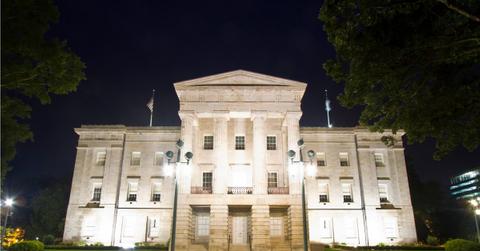Moore v. Harper, Explained: Are Voting Rights in Jeopardy?
Moore v. Harper is a case the U.S. Supreme Court will hear this fall. It could allow North Carolina legislators to draw unfair congressional district maps with partisan gerrymandering.
Aug. 8 2022, Published 10:42 a.m. ET

North Carolina state legislators have drawn congressional maps to favor GOP candidates, and the U.S. Supreme Court will decide whether it can do so.
A U.S. Supreme Court case regarding how congressional district lines are drawn in North Carolina will be heard this fall. The case, Moore v. Harper, is expected to have far-reaching consequences for not only that state, but potentially for presidential elections. Here’s a brief look at the case Moore v. Harper and what's at stake.
On June 30, the Supreme Court agreed to take on the case, which Republican legislators in North Carolina brought in regard to their congressional redistricting map. As the National Association of Attorneys General (NASG) explained, the North Carolina general assembly redrew its congressional elections map after the 2020 census, which opponents say involved partisan gerrymandering and violated the state constitution.
North Carolina’s legislators drew district lines to give Republicans a large advantage.
Following the 2020 census, North Carolina lawmakers created a new congressional district map, which would likely give GOP candidates the advantage in ten of its fourteen congressional districts, Vox reported.
According to the Brennan Center for Justice, on February 4, 2022, the North Carolina Supreme Court held that the gerrymandered map was unconstitutional. Then on Feb. 25, two legislators asked for a stay based on the “independent state legislature” theory.
The North Carolina Supreme Court challenged the map and offered an alternative. The state court’s map would even the playing field by offering Democrats the advantage in 6 of 14 districts (two more than with the state legislators’ map).
The Supreme Court case decision could award nearly total control over congressional maps to legislators, which would virtually guarantee that the party in power would continue to win reelection since gerrymandered maps couldn’t be overturned by state courts.
In 2020, that resulted in Democrats only winning 5 of 13 congressional seats despite winning 50 percent of the overall vote in North Carolina.

The case of Moore v. Harper could impact how certain votes count in North Carolina.
The case centers on who has the right to draw congressional district maps.
North Carolina Speaker of the House Tim Moore stated, “I am confident that this court recognizes what our state Supreme Court failed to recognize — that the United States Constitution explicitly gives the General Assembly authority to draw districts and that authority must be recognized.”
Any sense of “checks and balances” is at stake, as the state legislature claims it has full authority to draw congressional maps with no chance of the state courts challenging their decisions.
The course of presidential elections could be impacted as well, stated Jonathan L. Entin, professor emeritus of law at Case Western Reserve University School of Law.
According to howstuffworks.com, he noted, “Presumably if they can persuade the Supreme Court that the legislature has unfettered discretion to draw the maps, it also gives the state legislature the unfettered discretion to decide how to award the electoral votes in the presidential election.”
The Supreme Court will hear Moore v. Harper in the fall of 2022.
The SCOTUS will likely hear the arguments in Moore v. Harper sometime this fall, with a decision to be potentially handed down in the summer of 2023. Justices Samuel Alito, Neil Gorsuch, and Clarence Thomas have indicated their likely support of the GOP’s view of independent state legislature theory, according to NPR.
